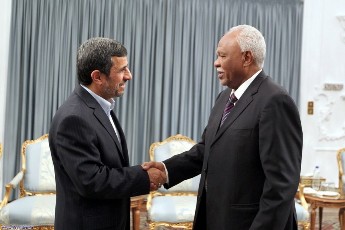Sudan oil minister in Iran to follow up on investment pledge
February 24, 2013 (KHARTOUM) – The Sudanese oil minister Awad al-Jaz arrived in Tehran on Sunday with a letter from president Omer Hassan al-Bashir to Iran’s Mahmoud Ahmedinejad.
 The composition of the Sudanese delegation which included the agriculture minister and deputy central bank governor implied the economic nature of the visit.
The composition of the Sudanese delegation which included the agriculture minister and deputy central bank governor implied the economic nature of the visit.
The official Fars news agency quoted Ahmedinejad as saying that “there are several important steps on the bilateral and Islamic world level that Tehran and Khartoum can undertake together in close cooperation for the benefit of people in two countries and other people”.
“The current global circumstances require us to stand shoulder to shoulder,” Ahmedinejad added.
Earlier this month in Cairo Ahmedinejad met with Bashir on the sidelines of the Organization of Islamic Cooperation (OIC) summit.
Following the meeting Sudan’s foreign minister Ali Karti said that he expects fresh Iranian investments to flow into the country but provided no details.
The Iranian president today alluded to economic sanctions and isolation imposed on the two countries by the west saying that “we with the help of each other can overcome the difficult conditions imposed by enemies on us”.
The Sudanese oil minister during his meeting with Ahmedinejad said that the relations between Iran and the Sudan are “based on Islamic principles and this relationship differs in kind from relations with other countries”.
He said that the “global arrogance” is conspiring against the Islamic world, and pointed to the need for the Islamic world to stand together in order to achieve its goals.
Al-Jaz called for increasing the level of cooperation between the two countries especially in the fields of energy and agriculture.
The ties between Iran and Sudan have been mainly focused on military aspects but the two countries have had negligible trade relations.
Last year Khartoum twice allowed Iranian warships to dock in Port Sudan drawing
concern of the United States and Saudi Arabia.
The ruling National Congress Party (NCP) in Sudan is itself divided on the extent of the relationship the country should have with Iran.
Sudan’s top diplomat publicly announced that he supports downgrading ties with Tehran in order to appeal to Arab Gulf Sunni states at odds with Shiite power Iran.
(ST)
